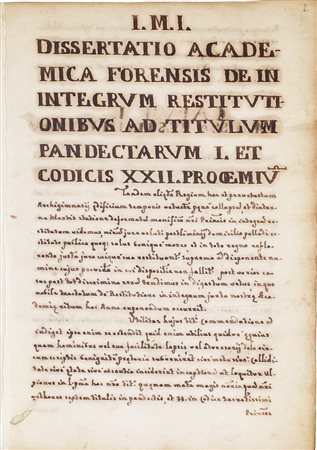 Bibliopathos - Via Enrico Toti 1, 37129 Verona
Bibliopathos - Via Enrico Toti 1, 37129 Verona
Medieval Notary Manuscripts & Law Books Sessione Unica - dal lotto 1 al lotto 280
lunedì 28 dicembre 2015 ore 17:00 (UTC +01:00)
APPARENTLY UNPUBLISHED LAW MANUSCRIPTCaputi, Andrea. Dissertatio Academica...
APPARENTLY UNPUBLISHED LAW MANUSCRIPT
Caputi, Andrea. Dissertatio Academica Forensis De integrum Restitutionibus at titulum Pandectarum I. et Codicis XXII. [at colophon:] die 22 mensis Maji 1737. Sub disciplina V.I.D.D.A. Andreae Caputi publici privatique Lectoris.
Large 8vo, later colored wrappers, ff. [102, the last is blank].
Uncommon, apparently unpublished, academic dissertation on the chapter Restitutio ad integrum of Justinian's Pandects.
Restitutio ad integrum is a Latin term which means «restoration to original condition». It is one of the primary guiding principles behind the awarding of damages in common law negligence claims. The general rule, as the principle implies, is that the amount of compensation awarded should put the successful plaintiff in the position he or she would have been had the tortious action not been committed. Thus the plaintiff should clearly be awarded damages for direct expenses such as medical bills and property repairs and the loss of future earnings attributable to the injury (which often involves difficult speculation about the future career and promotion prospects).
Although monetary compensation cannot be directly equated with physical deprivation it is generally accepted that compensation should also be awarded for loss of amenities, reflecting the decrease in expected standard of living due to any injury suffered and pain and suffering. Damages awards in these categories are justified by the restitutio principle as monetary compensation provides the most practicable way of redressing the deprivation caused by physical injury.






